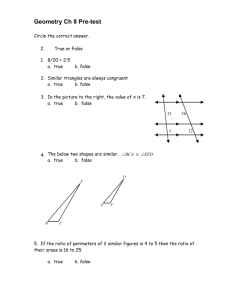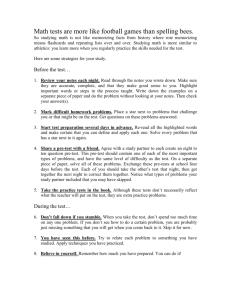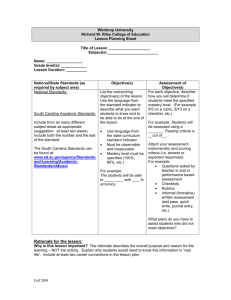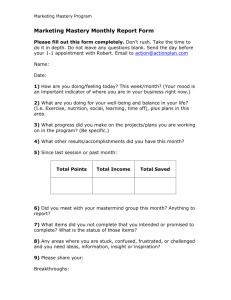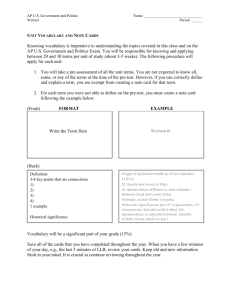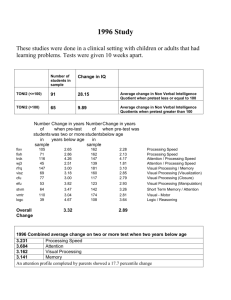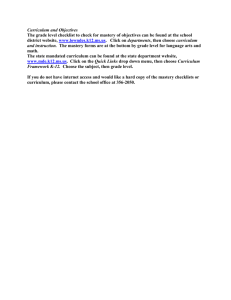The Mastery Learning Approach
advertisement
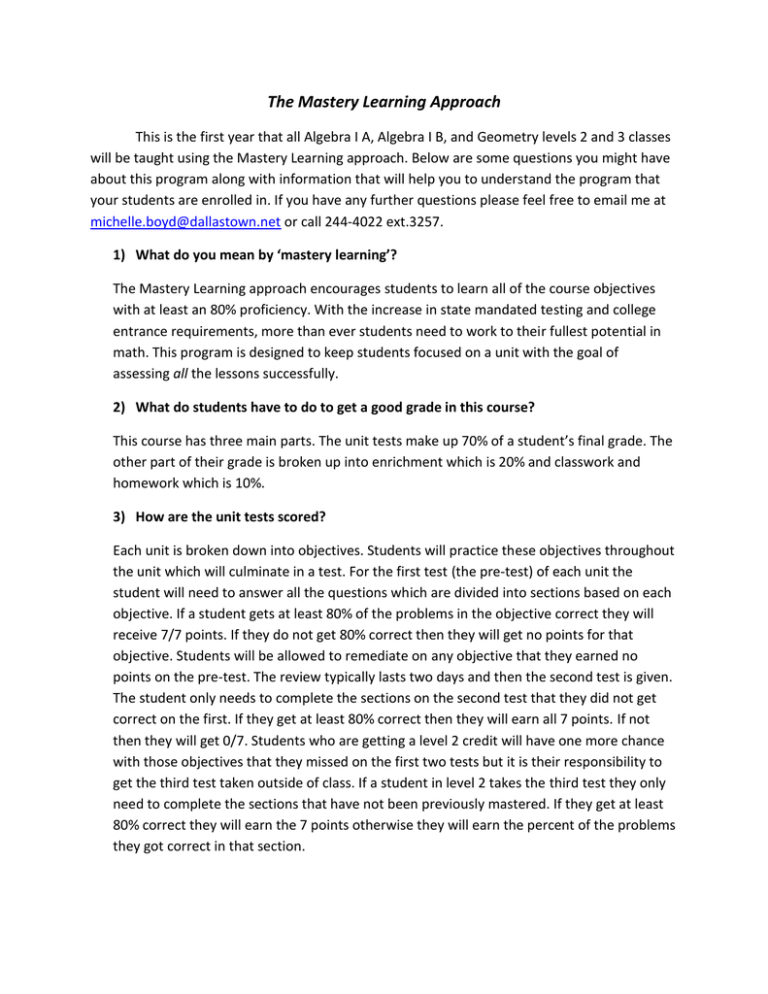
The Mastery Learning Approach This is the first year that all Algebra I A, Algebra I B, and Geometry levels 2 and 3 classes will be taught using the Mastery Learning approach. Below are some questions you might have about this program along with information that will help you to understand the program that your students are enrolled in. If you have any further questions please feel free to email me at michelle.boyd@dallastown.net or call 244-4022 ext.3257. 1) What do you mean by ‘mastery learning’? The Mastery Learning approach encourages students to learn all of the course objectives with at least an 80% proficiency. With the increase in state mandated testing and college entrance requirements, more than ever students need to work to their fullest potential in math. This program is designed to keep students focused on a unit with the goal of assessing all the lessons successfully. 2) What do students have to do to get a good grade in this course? This course has three main parts. The unit tests make up 70% of a student’s final grade. The other part of their grade is broken up into enrichment which is 20% and classwork and homework which is 10%. 3) How are the unit tests scored? Each unit is broken down into objectives. Students will practice these objectives throughout the unit which will culminate in a test. For the first test (the pre-test) of each unit the student will need to answer all the questions which are divided into sections based on each objective. If a student gets at least 80% of the problems in the objective correct they will receive 7/7 points. If they do not get 80% correct then they will get no points for that objective. Students will be allowed to remediate on any objective that they earned no points on the pre-test. The review typically lasts two days and then the second test is given. The student only needs to complete the sections on the second test that they did not get correct on the first. If they get at least 80% correct then they will earn all 7 points. If not then they will get 0/7. Students who are getting a level 2 credit will have one more chance with those objectives that they missed on the first two tests but it is their responsibility to get the third test taken outside of class. If a student in level 2 takes the third test they only need to complete the sections that have not been previously mastered. If they get at least 80% correct they will earn the 7 points otherwise they will earn the percent of the problems they got correct in that section. Example: Student A takes the unit 1 geometry pre-test which has 8 objectives. In the grade book each objective is listed separately so it might look like this: Objective Grade for 1st test 1.1 7/7 1.2 1.3 7/7 1.4 1.5 7/7 1.6 7/7 1.7 1.8 7/7 After the pre-test, student A will need to remediate on 1.2, 1.4, 1.7 since these were the objectives that they did not get at least 80% of the problems correct. For two days the student practices those three objectives. Then they take the second test but they only answer questions from sections 1.2, 1.4, and 1.7 since they already showed mastery on the rest of the test. Objective Grade for 2nd test 1.1 7/7 1.2 7/7 1.3 7/7 1.4 0/7 1.5 7/7 1.6 7/7 1.7 7/7 1.8 7/7 On the second test the student got at least 80% of the problems correct on sections 1.2 and 1.7 so they earned all seven points. If the student is earning a level 3 credit this would be their final grade for this test. If the student is earning a level 2 credit then they get one more chance to master 1.4. In class, the teacher moves onto the next unit so students will be expected to get help outside of class and schedule a time to take that one section for the final time. If the student gets at least 80% correct that last zero changes to a 7. If they get less than 80% then they get the percent they earned. For example, if students get 50% of the problems in 1.4 correct then the zero changes to a 3.5 since that is 50% of 7. 3) What will a student do during the review days if they master everything with the pre-test? Each student will be given enrichment for the unit. This work will allow students to bring all the objectives together to solve more complex problems. Students will have at least a week (often two) to complete this work and earn points towards that 20% of their grade. 4) Are students required to complete the review and enrichment? If students need to review any sections they must be working on that work during the class periods dedicated to work until they have successfully completed it all. They will need this extra help to earn all the points they lost on their pre-test. Enrichment is optional but without enrichment the best grade a student can get in this course is 80% and that is only if they complete everything else perfectly. 5) Where can students go for extra help? If the student is in level 2 they have three periods a cycle where they are required to work with a math teacher on their geometry skills. All students can go to the math lab in the back of the library during study halls if they get a pass from their teacher or Mrs. Adams (our Math Lab supervisor). There is a math teacher in the math lab every period of the day. As always, all students can make an appointment to meet with their teacher before or after school for extra help as well. 6) Are there any resources online that can help a student with their work? There are lots of websites dedicated to helping students with their math. On our high school website you can click on departments then mathematics to get to our department webpage. Under helpful links there are videos to help students keep up with the objectives. Students can also utilize my moodle page where I have a video for each lesson, objective and vocab sheets, practice worksheets, and completed notes. There are also review sheets with answer keys attached for every chapter. My moodle also has a link to our textbook resources and the Khan academy site which is free and allows students to try problems from a variety of courses giving them instant feedback to their progress.
